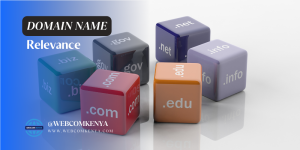Types of domain names
Types of domain names
In the vast landscape of the internet, domain names play a crucial role as the entry points to websites, serving as unique identifiers that directs users to specific online destinations. the structure and classification of domain names are diverse, encompassing various types that reflect their purposes and functions. In this article, we will delve into the different types of domain names, exploring their classifications and significance in digital realm.
Generic Top-Level Domains (gTLDs)
Generic Top-Level Domains (gTLDs) are among the most common types of domain extensions and are widely recognized across the internet. These domains are not specific to any country or region and often denote the nature or purpose of the website.
- .com: Originally intended for commercial entities, .com has become the most popular and versatile domain extension, suitable for various types of websites.
- .org: Traditionally associated with non-profit organizations, .org domains are used by a range of entities, including charitable groups, educational institutions, and community projects.
- .net: Originally designated for network-related organizations, .net domains are now used broadly by businesses and individuals involved in networking, technology, and online services.
- .info: Intended for informative websites, .info domains are used by entities sharing factual or educational content.
Country Code Top-Level Domains (ccTLDs)
Country Code Top-Level Domains (ccTLDs) are specific to individual countries or territories, representing their respective geographic locations. These domain extensions often indicate the origin or targeting of a website’s audience.
- .us (United States)
- .uk (United Kingdom)
- .de (Germany)
- .jp (Japan)
- .cn (China)
Each ccTLD is managed by a designated authority within the respective country and may have specific registration requirements or restrictions.
New Generic Top-Level Domains (new gTLDs)
In recent years, the domain name system has expanded with the introduction of new Generic Top-Level Domains (new gTLDs), offering greater diversity and customization options for website owners.
- .tech: Ideal for technology-focused websites and startups.
- .store: Tailored for e-commerce platforms and online stores.
- .blog: Designed for bloggers and content creators.
- .design: Geared towards creative professionals and design-related businesses.
New gTLDs allow businesses and individuals to secure domain names that align closely with their industry, niche, or branding strategy.
Internationalized Domain Names (IDNs)
Internationalized Domain Names (IDNs) support non-ASCII characters, enabling domain names to be written in local languages and scripts. IDNs play a crucial role in promoting internet accessibility and inclusivity for diverse linguistic communities worldwide.
- Example: .онлайн (Russian for “online”)
- Example: .संगठन (Devanagari script for “organization”)
IDNs enable individuals and organizations to establish an online presence using their native languages, facilitating broader internet adoption and engagement.
Specialty Domains
Beyond traditional gTLDs and ccTLDs, specialty domains cater to specific industries, interests, or communities.
- .gov: Reserved for U.S. federal government agencies.
- .edu: Restricted to accredited educational institutions.
- .museum: Reserved for museums and cultural institutions.
Specialty domains reinforce credibility and authenticity within their respective sectors, signaling a distinct affiliation or purpose.
Conclusion
The classification of domain names into various types reflects the evolving nature of the internet and its diverse user base. Whether it’s choosing a ubiquitous .com domain or a niche-specific new gTLD, selecting the right domain name is a strategic decision that can impact a website’s identity, visibility, and accessibility. Understanding the types of domain names empowers website owners and stakeholders to make informed choices that align with their objectives, target audience, and digital branding strategies in the dynamic online ecosystem.
For more updates and insights, follow us on Facebook @webcomcloud.
